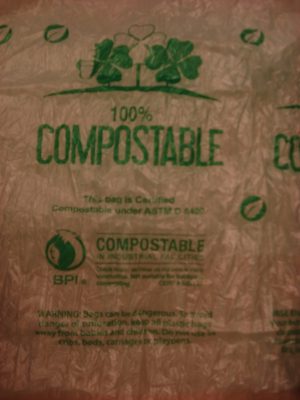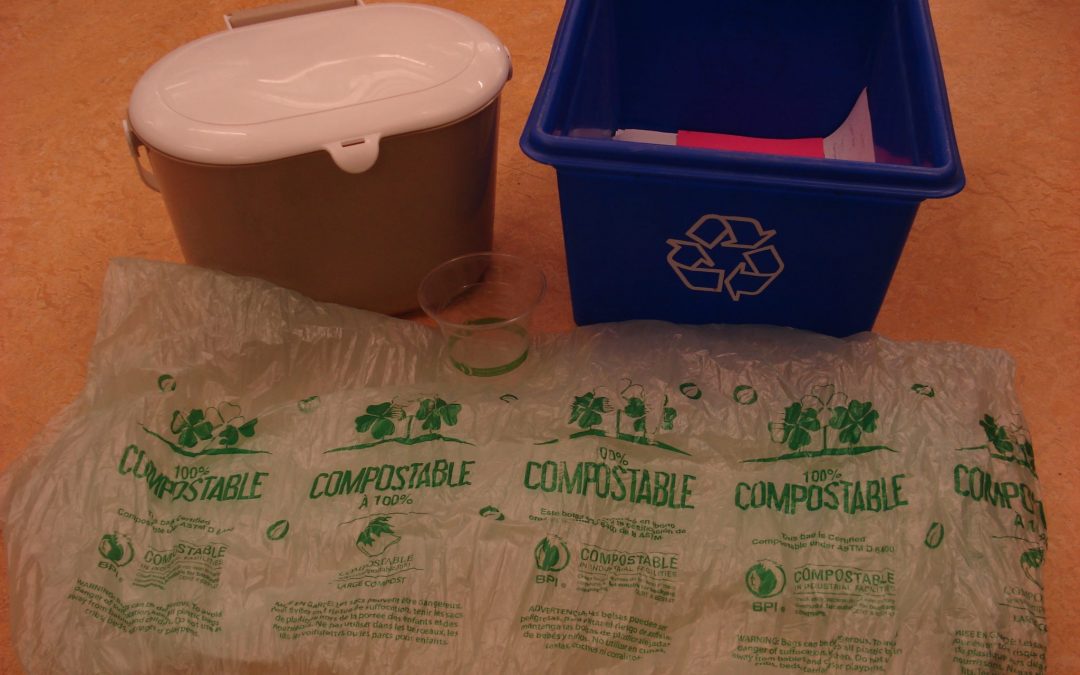When you’re an avoid waste-avoider, recycler, and composter like me, your ears perk up when you get handed a take-out container that isn’t made of Styrofoam. “All our containers are compostable plastic now!” your clerk might chirp excitedly, and you nod enthusiastically at the mention of compost. Compost is a good thing! You can add this to your compost bin and get lovely dirt from it – or maybe even toss it in the garbage, guilt-free. It’ll biodegrade in the landfill…right?
Not so fast.
Plastics
Without getting too technical about the science, you can make plastics out of oil and you can make them out of plants. Whether the plastic can be composted or will biodegrade has little to do with what it is made out of; that has more to do with what chemicals are in the plastic.
Biodegradable
Biodegradable sounds great, but doesn’t mean a whole lot. There is no standard for what this term actually means, so just like products branded “natural”, don’t be pulled in by the term. Biodegradable plastic, whether plant-based or otherwise, has a chemical additive that helps to speed up breakdown. By “speed up”, we mean timespans of about a decade, as opposed to dozens or even hundreds of years. Biodegradable plastics are likely to break down into smaller and smaller pieces of plastic, eventually creating those microbeads we all want to avoid – and if they’re buried in a landfill far from light, oxygen, and water, they may not even do that.
Compostable

Compostable plastics are a step up from biodegradable, as this term has an industry standard associated with it. To be labelled compostable, the plastic must biodegrade, disintegrate, and have no eco-toxicity within 180 days in a commercial compost facility. Because these plastics completely biodegrade, people make two common mistakes: the first is that they add them to their backyard bins, not realizing that these small-scale systems cannot generate the heat and type of microorganisms needed to break down the materials. The second mistake is that they believe that compostable plastics will break down if they end up in the landfill. In landfills, everything gets buried, resulting in everything organic from food scraps to bioplastics degrading anaerobically. This means that large quantities of methane gas, which is a greenhouse gas 25x more powerful than carbon dioxide, are produced. Brady Landfill is Manitoba’s second largest greenhouse gas emitter, largely for this reason.
What Should You Use Instead?
Until your municipality has a commercial composting facility that your compostable plastics can be processed in, compostable plastics just aren’t worth much. Hint: the City of Winnipeg doesn’t pick up organic waste for compost other than yard waste (though a small handful of Winnipeg institutions have their own industrial composters). If you use the Compost Winnipeg pickup service, you can compost BPI Certified Compostable materials with them, however. If you have to use a single-use container, pick recyclable instead. Keep in mind not all compostable plastics are recyclable, and not all cardboard takeout containers are recyclable either (many are coated with plastic that cannot be separated in our facilities). The best option is to go reusable! Bring your containers to takeout locations, meat counters, or delis, hand the container to them ahead of time, and let them know you’re going plastic free. They should zero the container on the scale, and then add your food, so that you don’t have to pay any extra.
Your Green Action For Today is…
- Good: get takeout in anything but Styrofoam
- Better: get your takeout in a recycled and recyclable container
- Best: get your takeout in a reusable container or better yet, cook something at home from local produce!
Want to be able to compost those great “compostable” plastics? Talk to your municipal politicians about getting a ‘green bin’ which can pick up all your yard waste, food waste, and compostable plastics.




Great Post. It bothers me how some folks really push the “but it is compostable” as an exuse for an item being single use. I am an avid composter and I long for the return to a time without “single use” items! I bring my own plate, cup and utensils whenever I go to an event that I suspect will not have re-usable items.
Yes, these things are much more complex than it seems on the surface! Reusable is ALWAYS better than single-use; kudos to you for bringing your own. I have a set of bamboo utensils I keep in my drawer at work for eating lunch; but rarely remember to bring my own cup and plate (always room for improvement). Remember, things are only compostable or recyclable “where facilities exist” and often in Winnipeg, they don’t exist. It’s REDUCE, reuse, recycle – in that order 🙂